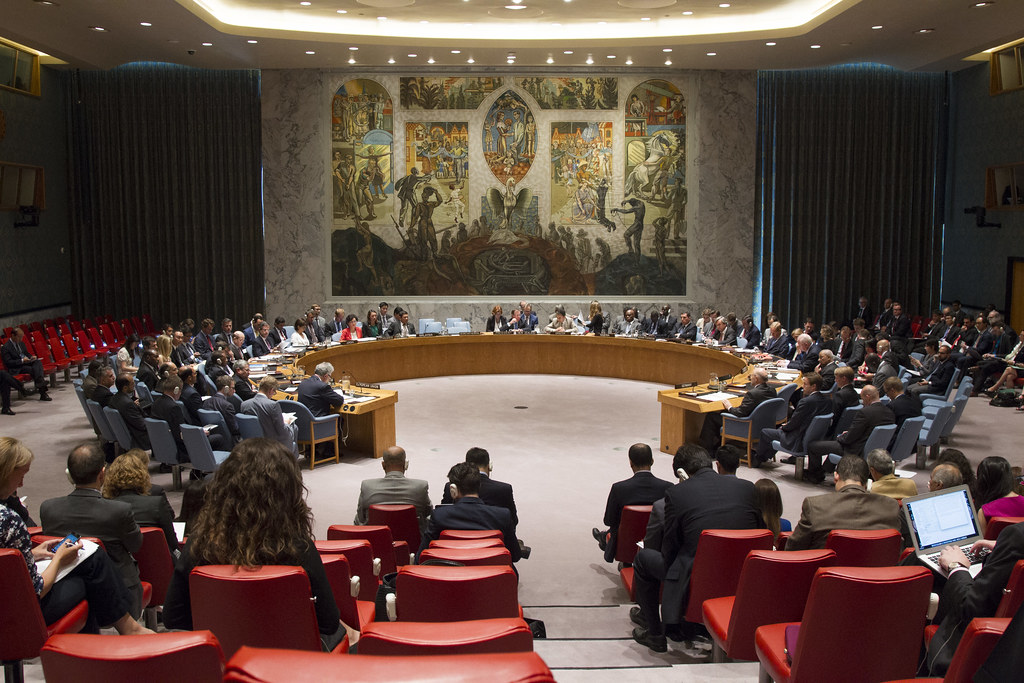In a recent New York Times op-ed, Majid Takht-Ravanchi, Iran’s ambassador to the United Nations, warned that “the window is closing” for the United States to rejoin the Joint Comprehensive Plan of Action, a 2015 multilateral nuclear agreement between Iran and several world powers. According to Takht-Ravanchi, lifting the U.S. sanctions on the regime is the only way to keep that window open.
In 2015, Iran agreed to stop enriching uranium, a crucial element for building nuclear weapons, and to allow inspections of its nuclear facilities in exchange for the end of international sanctions — the culmination of years of negotiations with the U.S., Europe, Russia and China. Before former President Donald Trump withdrew from the deal, Iran never violated the terms of this agreement.

Security Council Adopts Resolutions on Iran Nuclear Deal. (Creative Commons/United Nations Photo.)
Although President Joe Biden has signaled his intention to reverse the harm caused by Trump’s unilateral sanctions on Iran, the White House is still waiting for Iran to take the first step. Secretary of State Antony Blinken stated that the U.S. would rejoin the nuclear deal after Iran reduces its uranium stockpile and complies with the terms it agreed to five years ago. However, Iran has also demanded that the U.S. make the first concession.
Takht-Ravanchi threatened in his article that “if the new administration does not meet its obligations and remove sanctions in short order, it will destroy the possibility for engagement within the nuclear agreement.” The current standoff is in no one’s best interest. The U.S., as the supposed leader of the free world and the first country to have ditched this international treaty, should also be the first to return to the deal and restore its commitment to multilateralism.
Trump’s sanctions on Iran were counterproductive and the Biden administration should consign them to the past. Before Trump took office, Iran had about 102 kilograms of enriched uranium and committed to limit its production along with the nuclear deal’s requirement. After Trump withdrew from the deal and reimposed sanctions, Iran declared that the agreement no longer bound its activity, after which its uranium production soon exceeded 2,440 kilograms, according to the International Atomic Energy Agency. Iran’s determination to become a nuclear power was revived by Trump’s arbitrary abandonment of the deal, which fueled fears that security was only possible through domestic power, not capricious Western countries.
As the Iranian government thrives, Iranian civilians bear the brunt of U.S. sanctions. Despite U.S. countermeasures, Russia and China still collaborate with the regime on everything from oil trade to port infrastructure, disincentivizing Iran to succumb to American pressure. But Iranian citizens face a worse fate due to American sanctions, including high inflation and unemployment. This economic deprivation makes them less eager to turn out in elections and civil protests, which is a bad sign for democratization.
Trump’s sanctions also contribute to a revival of anti-Western sentiments in Iran. After Trump’s withdrawal from the Iran Nuclear Deal, hundreds of Iranians gathered, demonstrated, burned U.S. flags and waved banners and posters with the words “We fight. We die. We don’t surrender.” Whatever trust and empathy emerged between the West and Iran in 2015 now dissolves further every day. Poverty and privation resulting from sanctions are turning peaceful citizens into aggressive, desperate militants.
Biden’s administration should end this farce as soon as possible. Trying to pressure Iran into a concession has not worked since Trump abandoned the agreement in May 2018, and nothing indicates that this will change over the next four years. Biden’s inauguration has ignited new hope of better relations in Iran, but the opportunity to secure them is transient, and the window may only last a few weeks. The “maximum pressure” policy of the last two years will not miraculously become effective in 10 days. It is time for the U.S. to make the first move.
Compared with Iranian President Hassan Rouhani, Biden’s domestic political environment is favorable to saving the deal. While Rouhani faces stiff opposition from the conservatives in an election this June, the Democrats in the U.S. control both the House of Representatives and the Senate — a perfect opportunity for Biden to push for changes. Aside from legislation, Biden can also revoke some sanctions via executive orders.
Abandoning the Iran Nuclear Deal may be one of Trump’s worst mistakes, but it is not irreversible. The U.S. can still curb the nuclear proliferation in the Middle East, redress Iranians’ suffering and restore its global reputation for multilateralism; but Biden needs to act fast and act now.
Yun Zhu (23C) is from Shanghai.
Yun Zhu is from Shanghai, majoring in political science. In her spare time, she enjoys debates, writing novels and working out.




Why should we rejoin a deal that will allow the Iranian mullahs to develop a nuclear weapon within 5-10 years. These are the same mullah’s that have vowed to wipe Israel off the map and fund its terroristic surrogates under the nuclear umbrella. It will be people like you that bear culpability when this happens.
*Note how this article doesn’t even mention the Jewish state — the nation that will cease to exist should the Iranians develop a nuclear weapon! Awful reporting.